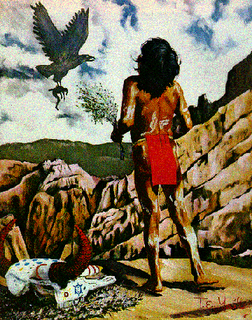This coming Sunday I'll be teaching from Luke 17 regarding the story of ten lepers who were healed. There's one little phrase out the outset of the story: "And it came about while He was on His way..." that stands out to me because it speaks of Jesus being open to interruptions. Kim George, who volunteers in our Tabitha ministry tells a story of just how precious divine interruptions can be:
Invitation
He came up to me on the street corner, probably fifteen years old. “I think he’s sick,” he says, pointing to a man sitting in the nearby bus shelter, draped with a dusty sleeping bag. A woman sits beside him and quietly studies the pavement at her feet. Walking past both of them, I had not seen anybody. The boy repeats his concern. The man under the sleeping bag coughs, doubling over, and the high school boy asks me if have a cell phone to call an ambulance. It seems dramatic, so instead I awkwardly offer change for the pay phone and run to catch my bus.
As I step away, I play my reel of excuses. This corner is full of people who want my money: I could empty my pockets every day if I decide to start responding. I’m a young woman, it’s getting late, and it’s probably time for me to get out of this shady street corner. I have a reasonable list of why this is not my problem- why it’s valid for me to exit a moment where I am invited to care for a homeless man on the corner.
Flagging down the approaching #5, the driver doesn’t see me and pulls away. As I return to the bus shelter, the boy apologizes profusely for the inconvenience he has caused me. I look at him, holding my ridiculous fifty cents in his hand, and am ashamed he is the one apologizing.
I kneel down and attempt to catch the face of the man under the sleeping bag. He nods off, seemingly sleepy, delirious, or on drugs. I ask what I can do for him and he mutters nothing. I turn to the woman and notice her bright fingernails and black knee-highs. “I’m Kimberly,” I say, holding out my hand. “Jessica,” she responds, taking my hand in hers. She tells me Brennan has not felt well for a month, coughing and sleeping a lot, with something wrong in his foot. I notice his left ankle is swollen twice the size of his right.
Turning back to Brennan, I again ask what I can do to help. Nothing, he says, I’m just tired. His face is still hidden under his sleeping bag. He loves that blanket, Jessica explains. I keep pressing him. All right, he says, somewhat sarcastically, why don’t you just give me some money? Cash I don’t have, but I offer to get dinner. Brennan is still suspicious, but Jessica decides to go with me to the corner market.
Walking to the store, I ask how she is doing. It’s really hard, she says. I am always worried about him. He’s getting sicker and is too stubborn to go to the doctor and I’m afraid to ever leave him. She looks over her shoulder as we cross the street, as though this is the first time she has not been by his side.
Entering the market, I tell her to order whatever she would like from the deli in the corner. Meanwhile, I find what I can for Brennan: Kleenex, a thermometer to take his temperature, bottled water. Jessica seems to relax a little bit, watching me shop and assuming I know what I am doing. I don’t really, just sort of making things up as I go, but it is nice for her to be able to relax. We leave with my attempt at medical supplies and Brennan and Jessica’s first meal of the day.
She begins to open up to me, many times expressing her thanks and sharing how hungry she is. Stopping in her steps, she looks at me intently. “Why would you help us?” she asks, posing the question with genuine curiosity.
We are silent on the street corner, and I hesitate with my response. It was not my intention to explain my motives. But like the moment when my bus pulled away, I sense I am drawn into a story that I did not write, with a role I had not planned. We stand on the corner, waiting for the light to turn, and for a moment Jessica reminds me of someone I love dearly.
I look at her and ask if she has ever heard the story of the Good Samaritan. Of course, she says. That’s why I offer help, because Christ taught that we love God in as much as we care for one another. I fear sounding preachy and want to withdraw into my reticence, but something lights up in her spirit and I continue. I begin to talk to her about this love. She grabs onto my arm, clinging to me and my words. I think you are an angel she says. I want to laugh, remembering how hard I tried not to help. The only angel in this story was a compassionate teenage boy who disappeared from the corner as suddenly as he had recruited me.
The Seattle skies open up and we get poured on. My umbrella is broken in three spots and only gives us a pathetic shelter. We laugh together as we cross the street.
I ask her what she loves to do and she begins to tell me of her old job, before she had medical problems and could not keep working. I worked for the state, she says proudly, as a caregiver for disabled adults. You know, she says, I am so blessed. Here were these adults in diapers, too embarrassed to leave their house for how the world would receive them. And here am I with so much. I can tango and make love and swim in the ocean. Her words hold this gratitude- this beautiful passion. We talk about how important is this work that she loves to do.
Arriving back at the bus shelter, Brennan and Jessica devour their dinner. Brennan looks up and for a moment I catch a glimpse of his face. Thank you very much, he says. It is our first moment of looking at one another. He is a tired, yet distinguished looking man. Proud, but sweetly thankful for the meal. It takes a great deal of courage for him to look up, and for a moment, connect with me. I stay while they both eat. Jessica, no longer shy, begins to ask me about me. I tell her I love to write and dance. She asks me if I am married. No, I say. Then you must be in love, she asks. I smile. No, not that either. Well, I don’t understand, she says. You are such a beautiful spirit. I tell her that there is pain unhealed, and now is the time to reclaim my heart. Jessica begins to cry, and I wonder how my words resonant in her own story. The sun breaks out from behind drenched clouds. Your tears are beautiful, I tell her, while the sun glistens on her cheeks.
Brennan is quiet. I suspect he is listening, but know he wants to be left alone. Jessica asks me about the Good Samaritan. I pull out a worn pocket Bible and flip Gospel pages. It’s funny because I can’t find the story that I have read so many times, but end up on the Samaritan woman at the well. What’s the difference, she wonders? So I try to tell the story. Jesus was with his followers-really just a bunch of fisherman- and he ventures to get water. Meeting a woman at the well, he begins to talk with her. His watching disciples can’t understand why he would be seen talking with her; it’s practically scandalous for the Jewish rabbi. First she’s a Samaritan (an ethnic group outcast by the religious leaders for their messy ancestry and a-typical worship), plus she’s been married five times and is currently living with another man. Society had deemed her outcast. But Jesus senses her need, knows she is thirsty for far more than the water at the well. So he begins to tell her about water that will quench her soul.
I tell my story and Jessica’s tears splash off her cheek. I hug her and soon my cheeks are covered with her tears. I begin to pray out loud: for Brennan’s healing, Jessica’s job, for a community of people that will care for them. I look over and notice Brennan. Jessica asks him what is wrong. He turns his head away from us, still finding escape in the blanket. But we both hear his weeping.
Jessica, with her passionate, intuitive words, begins to describe the love of “the God spirit”- unconditional and embracing and always waiting for you. She seems intimately connected to her words. There is not room for me at the bench. I am kneeling at her feet, and it is fitting.
 I’m preparing a talk for this weekend on the subject of how our relationship with culture affects our capacity to be witnesses to Christ. There will always be unanswered questions, always mystery, paradox, skepticism – and all of these in we who believe, let alone those who don’t. And so I’m a bit weak when it comes to believing that I can crush the doubters with my boatload of objective evidence. Someone recently asked the question, “Why doesn’t God ever heal amputees?” I suppose it’s a fair question, and I don’t have the answer. But my basis for faith is not rooted in God’s ability or willingness to prove, to my satisfaction, His ‘power’. Instead - I find the most compelling piece of the gospel is how it speaks to the deepest longings of our heart, if we'll but allow ourselves to long.
I’m preparing a talk for this weekend on the subject of how our relationship with culture affects our capacity to be witnesses to Christ. There will always be unanswered questions, always mystery, paradox, skepticism – and all of these in we who believe, let alone those who don’t. And so I’m a bit weak when it comes to believing that I can crush the doubters with my boatload of objective evidence. Someone recently asked the question, “Why doesn’t God ever heal amputees?” I suppose it’s a fair question, and I don’t have the answer. But my basis for faith is not rooted in God’s ability or willingness to prove, to my satisfaction, His ‘power’. Instead - I find the most compelling piece of the gospel is how it speaks to the deepest longings of our heart, if we'll but allow ourselves to long. 






